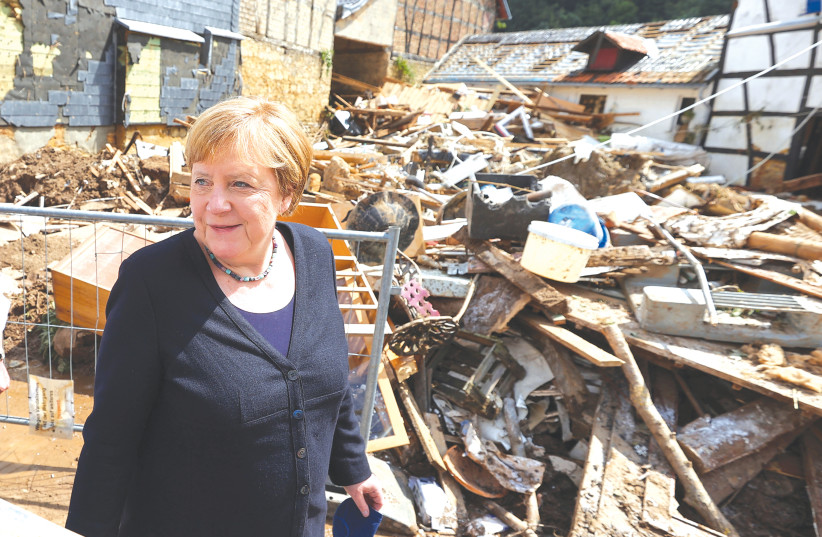Germans flocked to the polls on Sunday in a historic election that will see longtime Chancellor Angela Merkel replaced after 16 years in office, and the possibility that the balance of power in the country may shift away from her party.
Polling has put Merkel’s successor, Armin Laschet, and her Christian Democratic Union (CDU) party behind its main rival the Social Democratic Party (SPD) led by Olaf Scholz, while the Green Party headed by Annalena Baerbock is likely to play a prominent role however the elections turn out.
During her decade-and-a-half tenure, Merkel has been strongly supportive of Israel, while the Jewish community has grown and flourished during her time in office.
cnxps.cmd.push(function () { cnxps({ playerId: ’36af7c51-0caf-4741-9824-2c941fc6c17b’ }).render(‘4c4d856e0e6f4e3d808bbc1715e132f6’); });
if(window.location.pathname.indexOf(“656089”) != -1){document.getElementsByClassName(“divConnatix”)[0].style.display =”none”;}else if(window.location.pathname.indexOf(“/israel-news/”) != -1){ document.getElementsByClassName(“divConnatix”)[0].style.display =”none”; var script = document.createElement(‘script’); script.src = ‘https://player.anyclip.com/anyclip-widget/lre-widget/prod/v1/src/lre.js’; script.setAttribute(‘pubname’,’jpostcom’); script.setAttribute(‘widgetname’,’0011r00001lcD1i_12258′); document.getElementsByClassName(‘divAnyClip’)[0].appendChild(script);}else if(window.location.pathname.indexOf(“/health-and-wellness/”) != -1){ document.getElementsByClassName(“divConnatix”)[0].style.display =”none”; var script = document.createElement(‘script’); script.src = ‘https://player.anyclip.com/anyclip-widget/lre-widget/prod/v1/src/lre.js’; script.setAttribute(‘pubname’,’jpostcom’); script.setAttribute(‘widgetname’,’0011r00001lcD1i_12246′); document.getElementsByClassName(‘divAnyClip’)[0].appendChild(script);}
But the advent of a new political era has some Jewish officials in the country unnerved.
Gadi Gronich of the Conference of European Rabbis said that under Merkel Israel enjoyed “excellent relations” with the German government, which he said was Israel’s most dependable partner.
“This probably won’t continue in this manner,” he said, even if Laschet’s CDU party was to emerge as the largest party and he were to win office as chancellor.
 GERMAN CHANCELLOR Angela Merkel visits an area affected by floods caused by heavy rainfalls in Iversheim, a suburb of Bad Muenstereifel, North-Rhine Westphalian state, Germany, yesterday. (credit: REUTERS)
GERMAN CHANCELLOR Angela Merkel visits an area affected by floods caused by heavy rainfalls in Iversheim, a suburb of Bad Muenstereifel, North-Rhine Westphalian state, Germany, yesterday. (credit: REUTERS)
If the SPD becomes the biggest party and Scholz becomes chancellor, this could further reduce the warmth of feelings between the two countries.
Gonich noted that in most likely outcomes of the election, The Greens will enjoy significant power, and may even demand the foreign ministry in order to enter a coalition.
The party is less well disposed to Israel, said Gronich, and Baerbock as German foreign minister could result in more political pressure on Israel from both Germany and the European Union, where Germany is the leading power, alongside France.
“Germany would change from being a partner to Israel to something else,” said Gronich.
He also notes that Laschet himself has had close ties with Ditib, an organization representing Germany’s large population of Muslims of Turkish heritage, which has served as a mouthpiece for Turkish President Recep Tayyip Erdogan’s regime.
In particular, he observes disapprovingly of Ditib’s opposition to policies designed to ensure that imams serving Muslim communities in Germany are trained in Germany, and worries that Laschet might be reluctant to adopt such a stance.
Charlotte Knobloch, the head of the Munich Jewish Council and a former president of the Central Council of Jews in Germany, opines that what matters is not who ends up winning the election but instead how the coalition is formed.
If there is a grand coalition, as has been since 2017 between the CDU and the SPD, then there will be few problems regarding the relationship with Israel and communal issues, including antisemitism, that arise for the German Jewish community.
“If there is a grand coalition with a strong CDU, we can expect much fewer problems, and it wouldn’t matter who the chancellor is,” said Knobloch.
But, she said, if the SPD led a government with a prominent role for The Greens then things might be different.
“We can assume that there will be a change toward Israel and the Middle East, and less supportive back than there was in the past,” said Knobloch.
The same goes for the international Boycott, Divestment and Sanctions campaign against Israel.
“The support we have seen until now will not remain the same in the future if SPD is in power.”
Even on issues of Jewish communal practices, such as shechita (kosher slaughter), and brit milah (religious circumcision), Knobloch says she would be less confident in a government dominated by the SDP and The Greens to fight for Jewish rights on such matters.
Various green parties and others across Europe have advocated for, and in some cases succeeded in securing, policies that ban religious slaughter on animal rights grounds.
And legal challenges have also been made against circumcision as well.
“Things wouldn’t change from one day to the next, but if these issues get raised, the attitude of SPD and the Greens wouldn’t be so warm and embracing as the current government,” said Knobloch.
“If these questions would get raised then there might be a change in attitude. We are not so warmly connected to these parties, and neither is Israel.”

